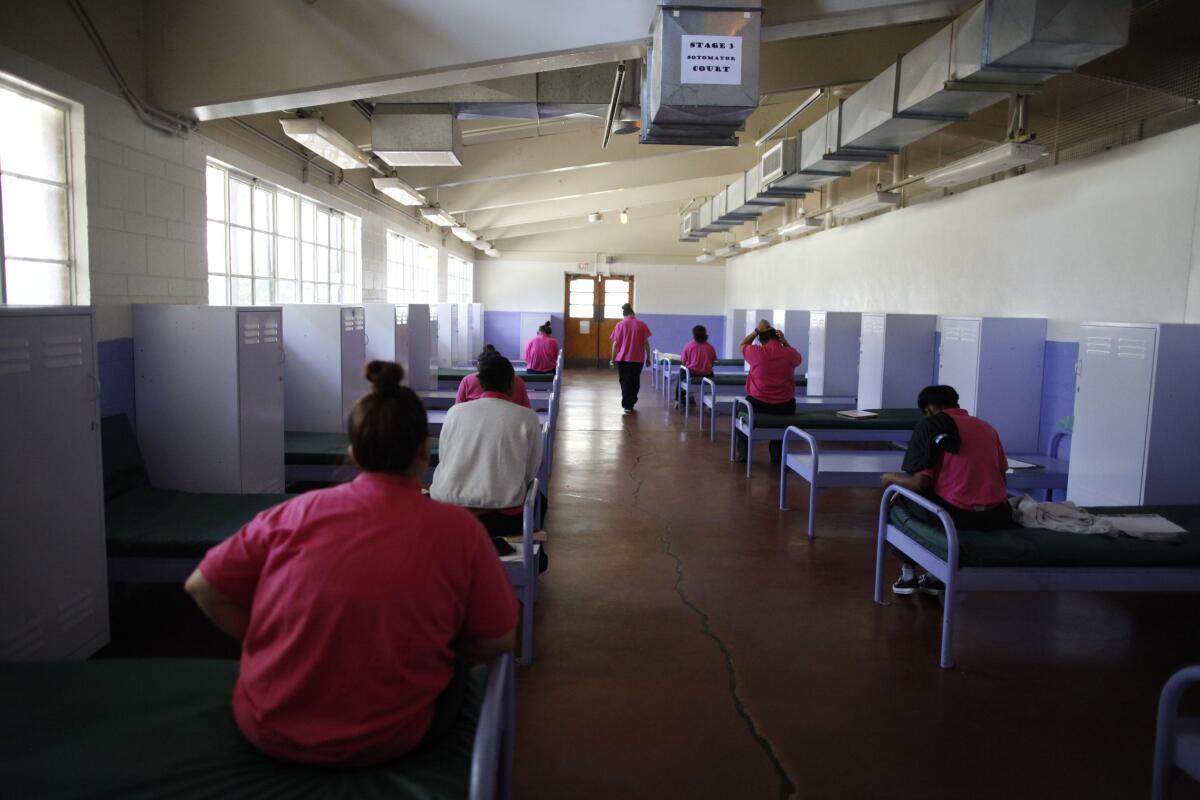Juvenile offenders will be housed at camps in Malibu, Santa Clarita and Commerce, supervisors decide

Despite opposition from local officials, the Los Angeles County Board of Supervisors has approved a plan to house juvenile offenders at probation camps in Santa Clarita, Malibu and Commerce.
On Tuesday, the board rejected a proposal championed by Supervisor Kathryn Barger to convert the troubled Barbara J. Nidorf Juvenile Hall in Sylmar into a centralized youth facility.
For the record:
3:28 p.m. April 29, 2022This story misnames a Sylmar youth facility as Barbara J. Nidorf Juvenile Hall. It is Barry J. Nidorf Juvenile Hall.
Instead, the supervisors voted 4-1, with Barger opposing, to house juveniles at Camp Kilpatrick in Malibu, Camp Scott in Santa Clarita and Dorothy Kirby Center in Commerce.
Until recently, juveniles convicted of serious offenses — including burglary, assault and homicide — would have been sent to state youth prisons. Counties are no longer sending juveniles to the state prisons, which will be closed in 2023, and must come up with alternative plans.
Kilpatrick, Scott and Kirby have campus-like environments, while Nidorf has been compared to a prison.
Supervisor Holly Mitchell said the move reflects a philosophy of rehabilitating young offenders, rather than a punishment-based system in a forbidding setting like Nidorf.
Under the plan, male offenders will be housed at Camp Kilpatrick and Camp Scott; female offenders will be at Camp Kirby.
Camp Scott, which has about 120 beds, housed female offenders before it was closed in 2020. Last week, at least 20 women sued, alleging they were sexually assaulted there over the course of a dozen years.
A $53-million makeover of Camp Kilpatrick in 2017 has made it a model for how the county treats lawbreaking kids in its care. About 40 beds there will be used as post-conviction housing.
Supervisor Sheila Kuehl said Nidorf “has become like an adult prison” and called it unsuitable for prolonged housing. She denounced the probation officers union, saying its leaders had compared juvenile offenders to animals while lobbying Santa Clarita and Malibu-area politicians to oppose the camps plan.
The Nidorf facility was labeled by state regulators last year as “unsuitable for confinement of youth.” Supervisor Janice Hahn listed some of the issues there; among them, maggots in the food and a lack of classes and activities.
Barger, whose district includes Santa Clarita, said the camps plan contradicts experts from the Probation Department, who in a detailed proposal concluded that Nidorf was the most appropriate setting. In a heated discussion with Mitchell, Barger said that over the past few years, “this board has adopted an unfortunate trend of not listening to experts and shopping for answers.”
Santa Clarita Mayor Laurene Weste said Camp Scott was in “dilapidated” condition and would need extensive upgrades. She and others also noted the Probation Department’s recommendation. Meanwhile, Santa Clarita Councilwoman Marsha McLean told the board the Nidorf proposal is “the fastest, safest and most cost-effective solution.”
The camps plan was also opposed by the Las Virgenes-Malibu Council of Governments. Its executive director, Terry Dipple, said officials near Camp Kilpatrick favored the use of Nidorf.
The supervisors’ adoption of the plan comes after state regulators on Friday again denounced conditions at Central Juvenile Hall. All youths held there were moved to Nidorf over the weekend.
Young male offenders will begin moving to Camp Kilpatrick on May 1. No move-in date has been set for Camp Scott, which needs renovations.
More to Read
Sign up for Essential California
The most important California stories and recommendations in your inbox every morning.
You may occasionally receive promotional content from the Los Angeles Times.











